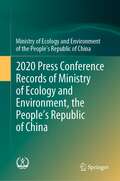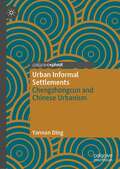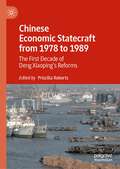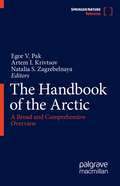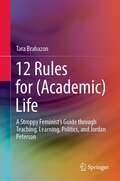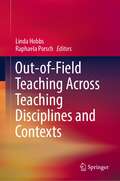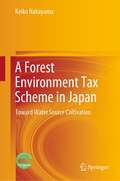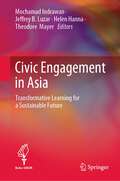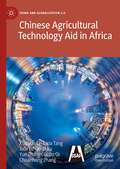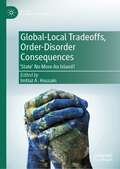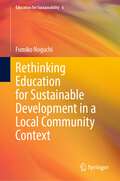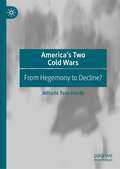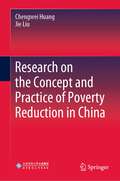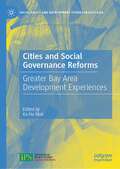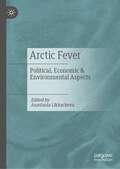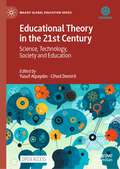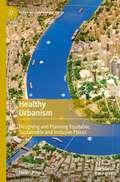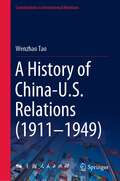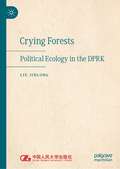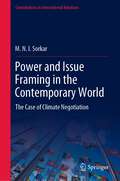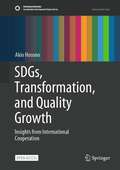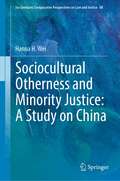- Table View
- List View
2020 Press Conference Records of Ministry of Ecology and Environment, the People’s Republic of China
by Ministry of Ecology and EnvironmentThis book records the press release of Ministry of Ecology and Environment of the People’s Republic of China in 2020. It is divided into three parts chronologically. The first part contains the records of Minister Huang Runqiu‘s attendance at the press conference of the National People's Congress and the Chinese Political Consultative Conference as well as the "Minister Channel". The second part contains the records of four press conferences on ecological and environmental protection held by the State Council Information Office of the People's Republic of China. The third part contains the records of 12 regular press conferences held by the Ministry of Ecology and Environment of the People’s Republic of China.
The China Question: Contestations and Adaptations
by Dragan Pavlićević Nicole TalmacsThe China Question: Contestations and Adaptations provides fresh perspectives on, and empirics about, China’s international relations through the lens of the local and regional configurations and developments around the world. While China’s foreign policy strategies have received much attention, and in particular the Belt and Road Initiative (BRI), the local contestations and/or adaptations that China provokes in the countries and regions it engages remain under-researched. In this book, a global collection of scholars examines how countries, societies, and individuals around the world are responding to China‘s rise.
Cyber Technological Paradigms and Threat Landscape in India
by Ramnath ReghunadhanThe book deals with technological governance of cyberspace and threat landscape, with a special focus on the Indian context. It provides a historical and chronological understanding of cyber threats across the world, and their impact on the nation-states. It places the cyber technological paradigms and platforms in various theoretical frameworks. The core section of the book deals with the cyber technological paradigms, i.e., governance, policing, and diplomacy in Digital India. The scenario of artificial intelligence (AI) in India is also dealt with, comparing AI in India with those of international actors. The book analyses in detail, the overall structural and institutional frameworks, entailing the need to leap towards what is considered as Reimagining India. It provides policy recommendations and suggestions on improving various actions, initiatives and resilience related taken in order to deal with the chaotic features of cyber technological threat landscape in India.
Urban Informal Settlements: Chengzhongcun and Chinese Urbanism
by Yannan DingThis book offers a concise and yet diverse study on the Chengzhongcun. It has a broader scope, both geographical and temporal, than existing works on this topic. The typical Chinese urban informal settlement is related to morphologically similar communities to be found elsewhere in the world. The chapters’ themes were inspired by the methods in historical geography, citizenship studies, and new cultural geography. What is truly unique to this book is that ten years after the basis material of this book was defended, it is enriched with practical experience and first-hand observations of the rapidly changing Chinese city. As urbanization in China slows, this book will interest sociologists, urbanists and scholars of China.
Chinese Economic Statecraft from 1978 to 1989: The First Decade of Deng Xiaoping’s Reforms
by Priscilla RobertsThis volume focuses on Chinese economic statecraft during the first decade of Deng Xiaoping’s reform and opening-up policies, from 1978 to 1989. During these years, Chinese economic engagement with the external world was tentative and experimental, with long-term strategies still decidedly under development. Prominent topics covered are China’s efforts to steer an economic course tailored to and representing what Deng Xiaoping famously described as “socialism with Chinese characteristics”; China’s quest for advanced science and technology; China’s dealings with international economic institutions, especially the World Bank; China’s engagement with other powers, including Japan, the United States, the ASEAN nations, and Europe; and the role of non-governmental organizations, including foreign policy think tanks, exchange groups, and educational institutions, in developing Chinese economic thinking and methodology during this decade. Contributors also focus on how elements of the Chinese military turned to building China’s new economic infrastructure, and on Chinese efforts to break into foreign markets. The volume ends with an overview and reassessment of earlier findings on Chinese economic statecraft in these years, by one of the leading Chinese experts on the PRC’s international policy.
The Handbook of the Arctic: A Broad and Comprehensive Overview
by Egor V. Pak Artem I. Krivtsov Natalia S. ZagrebelnayaThis book offers a broad and holistic overview of issues in the Arctic today, a region which is transforming due to changing world order and climate agenda. While new economic opportunities - and with China, as well as other geopolitical players in the region - are emerging, new security challenges are arising as well. In this comprehensive scholarly resource, contributors from around the world and from a broad variety of disciplines share their thoughts on the future of the Arctic, in a manuscript that will be of interest to researchers, economists, and policymakers.
The Ebb and Flow of Globalization: Chinese Perspectives on China’s Development and Role in the World (China and Globalization)
by Huiyao WangGlobalization is an irresistible force. Given the high stakes at hand – for stability, continued growth, and the future of our planet – it is more important than ever that China gain a deeper understanding of the rest of the world, and that the rest of the world also comes to a clearer understanding of China. This book focuses on globalization and China’s evolving role in the world, offering unique perspectives on a remarkable period, which saw the global landscape reshaped by China’s continued rise, intensifying great power competition, and a deadly pandemic. The essays center on three interconnected themes – China’s remarkable development under the Reform and Opening-up policy, China’s deepening integration into the global economy and rise in a multipolar world, and the quest to reinvigorate global governance and multilateralism to address the pressing global challenges of the 21st century. These insights are useful for academics, policymakers, students, and anyone trying to deepen their understanding of China’s development and role in making globalization work for our multipolar world.
12 Rules for (Academic) Life: A Stroppy Feminist’s Guide through Teaching, Learning, Politics, and Jordan Peterson
by Tara BrabazonThese are strange times. Climate crises. Health crises. Collapsing systems. Influencers. And yes - Jordan Peterson.We are currently living in a (Post) Peterson Paradigm. This book – 12 Rules for (Academic) Life - explores what has happened to teaching, learning and politics through this odd and chaotic intervention. Deploying feminism, this lens and theory offers a glass-sharpened view of this moment in international higher education. It is organized through twelve mantras for higher education in this interregnum, and offers new, radical, edgy and passionate methodologies, epistemologies and ontologies for a University sector searching for a purpose. This is a feminist book which targets a feminist audience, both inside and outside higher education. It presents a clear focus on how this Peterson moment can be managed and challenged, when in future such academics deploy social media in this way. This book is also a part of higher education studies, exploring the role of the public / critical / dissenting / organic intellectual in debates about the political economy, identity/politics and leadership.A question of our time – through a climate emergency, a pandemic and polarized politics – is why Professor Jordan Peterson gained profile and notoriety. The Jordan Peterson moment commenced in September 2016 with his YouTube video, “Professor against political correctness,” and concluded with his debate with Slavoj Zizek on April 19, 2019. From this moment, his credibility was dented, if not destroyed.Jordan Peterson infused scholarly debates with Punch and Judy extremism and misunderstandings. Instead, this book offers research rather than certainty, interpretation rather than dogma, evidence rather than opinion, and theory rather than ‘moral truth.’ The goal is to recalibrate this (Post) Peterson Paradigm, to take stock of how this moment occurred, and how to create a revision of higher education.
Out-of-Field Teaching Across Teaching Disciplines and Contexts
by Linda Hobbs Raphaela PorschThis edited book is a compilation of research by the members of the Out-of-Field Teaching Across Specialisations (OOF-TAS) Collective, and is the second book by the Collective. It extends from the work begun in the 2019 book, Examining the Phenomenon of “Teaching Out-of-Field” by showcasing the broad range of research agendas and findings relating to this phenomenon internationally. This book provides research and commentary relating to the out-of-field teaching phenomenon in primary, secondary and tertiary education, and across different subjects. It provides snapshots of the effects, causes, measurement, and other characteristics of out-of-field teaching in and across contexts, including states and countries, school types and school levels, subjects and specializations. The different chapters provide commentary at different units of analysis, and focus on: the effects of out-of-field teaching for teachers and their students; the school contexts/cultures that do or do not support them; the leadership practices that assign the teachers to out-of-field subjects; and the systems that create/perpetuate the need for out-of-field teaching assignments. Chapter 15 is available open access under a Creative Commons Attribution 4.0 International License via link.springer.com.
A Forest Environment Tax Scheme in Japan: Toward Water Source Cultivation
by Keiko NakayamaThis book is a work that focuses on the forest environmental tax. Forest resources have played a major role in preventing global warming by absorbing carbon dioxide and supplying oxygen. However, global economic growth has adversely affected the global environment and has exacerbated global warming due to excessive consumption of forest resources. The functions or “services” of forests are diverse, but the interest of the citizenry in forest cultivation is scarce since forests are public goods. Concurrently, Japanese forestry, which has played an important role in forest conservation, is steadily declining, and it is no longer possible for private forest operators to maintain the forest environment. Therefore, in order to realize sustainable economic growth, it is necessary to formulate policies for the conservation of appropriate forest environments. Forest conservation is an especially important policy issue for Japan, where two-thirds of the country is forested. In Japan, a forest environmental tax is being introduced as a forest conservation policy. As of 2021, the forest environmental tax has already been introduced in about two-thirds of the prefectures and soon will be introduced as a national tax. In this book, the significance and issues of the forest environmental tax will be sorted out, and the status of the introduction of the forest environmental tax in Japan will be compared with that of other countries. In addition, there is additional material regarding the water source conservation fund in Toyota City, Aichi Prefecture, a system similar to the forest environmental tax.
Civic Engagement in Asia: Transformative Learning for a Sustainable Future
by Mochamad Indrawan Jeffrey B. Luzar Helen Hanna Theodore MayerThis book confronts issues relating to climate change and sustainable development innovations in Asia, with attention to key issues and applications in terms of advocacy, governance, citizen science, tradition, faith, leadership, and education. With contributions by 31 leading thinkers from countries in Asia, the book presents issues and poses potential solutions for sustainable development, responding to questions relating to problems prioritized by non-state actors for civic engagement. It also puts forward key strategies and methods used for civic engagement. Drawing from diverse sets of practical and scholarly experience and expertise in geographical and social arenas, authors draw from real-time engagement with specific peoples, often associated with civil society organizations, and conduct an exploration of the essential issue of what the world means in the context of different cultures, thus constructively fusing the two key themes of ecology and anthropology. In doing so, this book enables new ways of thinking about human relationships with nature, relating rich and diverse examples of transformative learning. Co-published with Indonesian press OBOR, this is a vital collection for practitioners and researchers working in areas of ecology, sustainable development, human ecology, governance, geography, environmental science and post-neoliberal economics, particularly in an Asian context. "Civic Engagement in Asia weaves together a set of fascinating stories and examples of sustainable development practice told from the perspectives of non-state actors. Written by a set of top scholars and activists from around the region, it will be an informative read for all those who feel a sense of urgency around the environmental, social, and economic transformations taking place across Asia today” - Celia Lowe, Professor of Anthropology and International Studies, University of Washington, Seattle
Chinese Agricultural Technology Aid in Africa (China and Globalization 2.0)
by Xiaoyun Li Lixia Tang Jixia Lu Xiuli Xu Yue Zhang Gubo Qi Chuanhong ZhangThe book presents findings of anthropological studies conducted by researchers from Agricultural Technology Demonstration Center in a number of African countries, including Zimbabwe, Ethiopia, Tanzania, and Mozambique. The aim of these ethnological studies is to understand the Center’s experience in these countries as well as the way it works in terms of institutional arrangement, interaction between Chinese and local staff and technology transfer. A basic contention of the book is that insofar as these Centers showcase China’s achievements in domestic development for purpose of sharing the country’s experiences with host countries, what they do essentially points toward a new and innovative approach to foreign aid.
Global-Local Tradeoffs, Order-Disorder Consequences: 'State' No More An Island? (Global Political Transitions)
by Imtiaz A. HussainIn this book, ten substantive chapters examine how collisions between technological developments (globalizing forces) and thickening populist pressures (localizing dynamics) constantly keep reinventing the state in unforeseen and unpredictable ways. We learn of how international organizations have fared, and to what extent grass-roots grumbles have impacted big-picture developments in quite diverse parts of the world. Just placing unfolding crises under the microscope cannot but generate policy-solving observations. Treated in corresponding order, these crises revolve around adjusting international institutions; absorbing current populist outbursts; shifting from peacekeeping to peacemaking; spying in the global south; absorbing displaced persons; Rwandan land reform; pandemic and RMG readjustments; Bangladesh’s democratic transition; Rohingyan-Syrian refugees; and Mexico’s 1990s liberalization. Though overarching, observations in the book accent state strength battling with state porosity; the downward spiraling of global order; and the simple lack of any controlling mechanism against globalizing/localizing dynamics in the trenches of everyday life being matched by continued uncertainty on the analytical plane.
Rethinking Education for Sustainable Development in a Local Community Context (Education for Sustainability #6)
by Fumiko NoguchiThis book bridges the gap between Education for Sustainable Development and community development and examines the contributions of critical environmental education as a theoretical framework to the policy, research, and practice of Education for Sustainable Development. The book investigates what Education for Sustainable Development really means when it happens from the perspectives of a marginalized individual at the very bottom of society in a local community, where there is no such ‘educational’ institution, no policy or no curriculum to support the effort, but there is the necessity of learning and empowerment for changing the situation. In particular, drawing on the experience of the indigenous Ainu fisherman, it critically examines the theoretical foundation of Education for Sustainable Development, critical environmental education, investigating methodologically and epistemologically the relevance and efficacy of critical environmental education to socially critical approaches to Education for Sustainable Development in a community development context. And this investigation leads to develop a praxis framework for socially critical Education for Sustainable Development in a community development context so that both fields would be mutually supportive to strengthen the practices.
America’s Two Cold Wars: From Hegemony to Decline?
by Alfredo Toro HardyThis book focuses on ascertaining what distinguishes the Cold War that the U.S. sustained with the USSR from the one now emerging with China. By comparing their characteristics, it elaborates on how well prepared the US is to undertake this fresh challenge. In doing so, the book analyses six fundamental differences between both cold wars; ideology, alliances, strategic consistency, military, economics, and containment. While the configuration of factors benefited the US during its first Cold War, they now point in the opposite direction. While the first Cold War was instrumental in projecting the US to the pinnacle, the second can only accelerate its dwindling.
Research on the Concept and Practice of Poverty Reduction in China
by Chengwei Huang Jie LiuFrom both theoretical and practical perspectives, this book systematically expounds the important theories, key measures and major achievements in the field of poverty alleviation in China, and sums up the important experience of poverty alleviation, it answers the significant question why China has been able to lift itself out of poverty and build a moderately prosperous society in an all round way. China has accumulated experience for achieving the two centenary goals, and contributed Chinese wisdom and Chinese solutions to the global cause of poverty reduction.
Cities and Social Governance Reforms: Greater Bay Area Development Experiences (Social Policy and Development Studies in East Asia)
by Ka Ho MokThis book examines critically how the Chinese government has proactively engaged the nine cities and two special administrative regions in the Greater Bay Area (GBA) in Southern China for deeper collaborations in order to transform the country from the “World Factory” to become a leading world economy in innovation and entrepreneurialism. While most of the existing research related to China’s GBA development offers the economic and technological advancement perspectives, this book focuses on critical reflections upon how the call for megacity development and deeper regional collaborations in the Bay Area will affect people’s livelihoods, social integration and urban governance. The central theme of this book builds around “Cities, Social Cohesion and Governance.” Based upon policy and document analysis, first-hand fieldwork and surveys, and intensive interviews with major stakeholders responsible for pushing the Greater Bay Area development, this book offers not only regional perspectives in analyzing the Greater Bay Area development through comparing and contrasting development experiences within the country’s different bay economies like the Shanghai and Zhejiang Bay Area and Beijing and Bohai Bay Area. The present book also draws comparative and international insights from other well- established bay economies like Tokyo Bay, Florida Bay and New York Bay Areas when analyzing the development in the GBA in China.
Arctic Fever: Political, Economic & Environmental Aspects
by Anastasia LikhachevaThis book explores the Arctic as a rapidly evolving phenomenon in international affairs of a rising number of stakeholders. For decades, Arctic studies used to be an affair of a relatively narrow group of experts from northern countries. This time is over due to a new Chinese Arctic policy, as well as growing regional interests from South Korea, Singapore, India and Japan. Contributors reflect on new roles for the Arctic region: both as a playground for the old school nation state competition and even confrontation, and a new source for international cooperation in energy, logistics and natural sciences. Climate change, political tensions and economic competition make Arctic a hotter venue of international relations. This new Arctic fever, studied through a comparative analysis of different regional agendas, especially with a focus on the US–China–Russia triangle, represents the main subject of our book, which will be of interest to scholars of geopolitics, of climate change, and of 21st century energy economics.
Educational Theory in the 21st Century: Science, Technology, Society and Education (Maarif Global Education Series)
by Yusuf Alpaydın Cihad DemirliThis open access book reviews the effects of the twenty-first century scientific-technological and social developments on the educational theory. The first part handles the subject, focusing on technology and educational philosophy. In the second part, the implications of new human and social conceptions towards the education paradigms are examined. In the chapters of the last part of the book, more practical dimensions of education are discussed. Transforming school designs, school management, learning-teaching approaches and teacher competencies are discussed in the context of broader social, cultural and technological changes.
Healthy Urbanism: Designing and Planning Equitable, Sustainable and Inclusive Places (Planning, Environment, Cities)
by Helen PineoThe globally distributed health impacts of environmental degradation and widening inequalities require a fundamental shift in understandings of healthy urbanism. This book redefines the meaning and form of healthy urban environments, urging planners and design professionals to consider how their work impacts population health and wellbeing at multiple spatial and temporal scales. The concepts of equity, inclusion and sustainability are central to this framing, reversing the traditional focus on individuals, their genes and ‘lifestyle choices’ to one of structural factors that affect health. Integrating theory and concepts from social epidemiology, sustainable development and systems thinking with practical case studies, this book will be of value for students and practitioners.
A History of China-U.S. Relations (Contributions to International Relations)
by Wenzhao TaoThis book contains the history of China-U.S. Relations (1911–1949), including China-US relations in Early Republican Period, the impact of Versailles Peace Conference and Washington Conference on China-US relations, US support for Northern Warlord Government, the Guangzhou Revolutionary Government, and the Nanjing National Government. During the War of Resistance Against Japanese Aggression, the United States went from neutral to form an alliance with China against Japan. After the end of the War, China and the United States gradually moved toward confrontation. This book also has a brief description of China-US relations from 1784 to 1911.
Crying Forests: Political Ecology in the DPRK
by Liu JinlongThis book aims to provide a comprehensive analysis on social, economic, and political issues to understand why forests in the Demacratic People's Repblican of Korean have been so severely deforested. Deforestation and forest degradation issues in the DPRK has been highlighted as an important international political issue, which has been intervening with food security issues and energy issues, and it's hard to discover the way out. The DPRK provides a unique case to international community that illustrate why the forests issue is so complex, illuminating the issues of declining forest coverage that beset developing nations around the world. This book will interest political scientists, conservation ecologists, and journalists.
Power and Issue Framing in the Contemporary World: The Case of Climate Negotiation (Contributions to International Relations)
by M. N. SorkarThis book puts forward a new angle of understanding the society of states in the milieu of the contemporary world. The absence of a regulatory mechanism, i.e., anarchy, has been the fundamental issue of international relations. This book explains how the normative imperatives, information and communication technology (ICT) and nuclear deterrence generated ambiance have poised the states in a society where they are bound to follow certain normative imperatives that dilute the color and meaning of anarchy and obliges the states to act in a certain way. It develops a theoretical proposition with regard to state power defined in terms of the capability of determining the outcomes. The proposition first elaborates how international institutions foster normative imperatives; then, in line with this ontology, it narrows down the focus solely on the power of the states in the contemporary world. It explains how the power that can determine the outcome today is holistic in nature, comprising both materialistic and normative factors. In the next step, it tailors the proposition in a way so as to employ it for a specific empirical work. The book does not end just positing the theoretical proposition; the proposition is testified through some case studies with regard to climate negotiations under the UNFCCC. The empirical part not only serves to examine the plausibility of the theoretical proposition, but it also presents the logic of the major actors and the politics with respect to some of the major issues of climate change, i.e., mitigation, funding policy and mechanism and adaptation. The scholars in this arena, climate activists and climate-conscious people in general would find this book worth reading as it kindles a different angle to understand the issues in the context of the contemporary world and as it elaborates the logic, framing process, and mechanism of reaching outcomes through complex negotiation process. No other work has so far analyzed the issues covering the entire period of 21 apex UNFCCC negotiations that led to the Paris Agreement. Apart from university libraries, this book, thus, has the prospect to be sold in the markets targeting the academicians, climate change experts, bureaucrats, negotiators and the common readers.
SDGs, Transformation, and Quality Growth: Insights from International Cooperation (Sustainable Development Goals Series)
by Akio HosonoThis is an Open Access book. The primary objective of this book is to seek out insights into the concept of high-quality growth (HQG). It explores the essential attributes of HQG, such as inclusiveness, sustainability, and resilience, as well as its relationship with transformation, by drawing principally on illustrative cases and instances of international cooperation. The United Nations document on Sustainable Development Goals (SDGs) states that “We resolve to create conditions for sustainable, inclusive and sustained economic growth, shared prosperity and decent work for all.” As such, the concept of quality growth is inherent in many aspects of the SDGs. A similar approach can be seen in the Development Cooperation Charter announced by the Japanese government in 2015. According to the Charter, one of the most important challenges of development is quality growth and the reduction of poverty achieved through such growth. The approach in the Charter emphasizes inclusiveness, sustainability, and resilience.This volume is a pioneering study on quality growth as well as its relationship with SDGs and transformation. Comprehensive studies on quality growth are very few. The case study approach distinguishes the present volume from some previous literature that discussed quality growth within the framework of general policy. Instead, in this book, concrete cases and experiences provide insights into hands-on “ingredients”. Through the case studies, it can be seen more clearly that transformation and quality growth are phenomena that do not occur automatically but, rather, ones that require specific, properly designed strategies and approaches. Another unique feature of this book is that it aims to make explicit some of the consistent, but implicit, principles of Japan’s international cooperation.
Sociocultural Otherness and Minority Justice: A Study on China (Ius Gentium: Comparative Perspectives on Law and Justice #88)
by Hanna H. WeiThis book draws attention to the nonlegal, sociocultural aspects of justice for minorities in China. The primary objectives are threefold. The first is to present a tentative analysis of the lived realities of being ‘the other’ in China, with the aim of presenting a critical picture of the complex national context and identifying main concerns and key challenges. Six topics are covered - gender roles, health, class, intimacy, ethnicity and religion, and expression. The second objective is to explore the interaction between a wide range of factors and myriad systems that enable or hinder protection and justice for these groups, be they historical, political, social, or cultural, hoping to open up a rich domain of inquiry for those interested in to what extent and in what ways otherness may or may not survive in China. The third objective is to bring attention to new trends and developments, some are easily identifiable whereas others are less detectable, some are interrelated while others are relatively isolated, some are straightforward and others remain easily misinterpreted.
